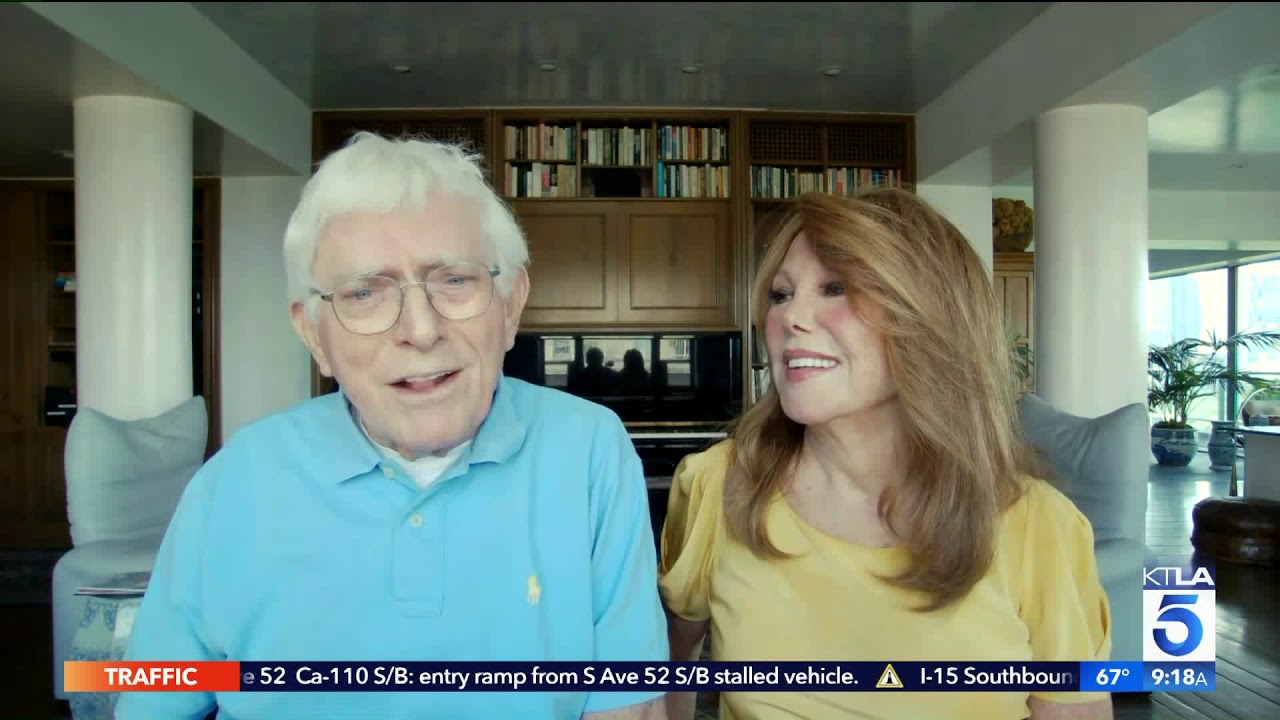(ThyBlackMan.com) Phil Donahue, the groundbreaking talk show host who revolutionized daytime television and paved the way for a new era of candid, audience-driven programming, has passed away at the age of 88. Known as a pioneer in the talk show industry, Donahue’s influence remains evident in the modern landscape of daytime television. His legacy is not just one of innovation but also of courageous conversations that broke societal taboos and invited America to engage in a dialogue that had never been seen before on TV.
Donahue’s death, announced by his family, marks the end of an era. He succumbed to a long illness on Sunday night, leaving behind a legacy that has touched countless lives. His survivors include his wife of 44 years, Marlo Thomas, known for her role in “That Girl,” and their children. The couple’s love story, which began when Thomas appeared as a guest on his show, remains one of the most cherished narratives in the history of television.

A Visionary Beginnings: Redefining Daytime Television
Born in Cleveland on December 21, 1935, Phil Donahue was the youngest of two children in a working-class family. His father was a furniture salesman, and his mother, a former elevator operator, later became a homemaker. From these humble beginnings, Donahue would go on to revolutionize television, creating a platform that gave voice to the voiceless and challenged the status quo.
Donahue’s early career was marked by a relentless pursuit of truth and a passion for journalism. After graduating with a degree in business administration from Notre Dame in 1957, he began his career in media with farm reports on WNDU-TV. However, it was his stint as a news director at a small radio station in Adrian, Michigan, that ignited his love for journalism.
In 1967, Donahue launched “The Phil Donahue Show” from Dayton, Ohio, a move that would change the course of television history. The show, which began as a local program, quickly gained popularity due to its unique format. Unlike the lighthearted, celebrity-focused talk shows of the time, Donahue’s show was issue-oriented, tackling controversial and often taboo topics that were rarely discussed in public, let alone on television.
From its inception, Donahue’s show was different. It featured a simple set-up with Donahue and his guest seated on folding chairs in front of a live studio audience. The show had no band, no sidekick, and no frills—just raw, unfiltered conversation. What truly set it apart was Donahue’s willingness to engage the audience directly, inviting them to ask questions and participate in the discussion. This was a revolutionary concept at the time, turning passive viewers into active participants and making the audience an integral part of the show.
Donahue’s choice of topics was equally groundbreaking. He addressed issues like abortion, incest, homosexuality, and other subjects that were considered too controversial for mainstream media. His show provided a platform for voices that had been marginalized and brought these important conversations into American living rooms. This approach not only made Donahue a household name but also set the standard for talk shows that followed.
Rivalry and Friendship: The Oprah Effect
For much of the 1970s and early 1980s, Donahue reigned supreme as the king of daytime television. His show, which moved to Chicago and later to New York, was the most-watched daytime program, attracting millions of viewers, most of whom were women. Donahue’s influence was so profound that his name became synonymous with intelligent, thought-provoking television.
However, in 1985, a new force emerged on the scene—Oprah Winfrey. Winfrey, who had been hosting a local talk show in Chicago, launched “The Oprah Winfrey Show” nationwide, and the impact was immediate and immense. Oprah’s show quickly gained a massive following, and by 1987, she had overtaken Donahue in the ratings, becoming the new queen of daytime TV.
Despite the fierce competition, Donahue and Winfrey shared a deep mutual respect. They were often seen as rivals, but their relationship was far more complex. Both recognized the importance of what they were doing—providing a platform for important social issues and giving a voice to the underrepresented. In many ways, they were two sides of the same coin, each pushing the boundaries of what daytime television could be.
Winfrey, who has often credited Donahue as a major influence on her career, once said, “Had there not been a Phil Donahue, I don’t believe there could have been an Oprah.” In 1996, when Donahue decided to retire after nearly three decades on the air, it was Oprah who presented him with a Lifetime Achievement Award at the Daytime Emmys. Her tribute to him was heartfelt: “I want to thank you for opening the door so wide, wide enough for me to walk through.”
The Legacy of a Trailblazer
Donahue’s decision to retire in 1996, after more than 6,000 episodes and 29 years on air, marked the end of an era. By that time, he had won 11 Daytime Emmys and had left an indelible mark on the television industry. His influence can be seen in the many talk shows that followed, from “The View” to “Dr. Phil,” all of which owe a debt to Donahue’s pioneering format.
Even after his retirement, Donahue remained a respected figure in the media world. In 2001, he reflected on his career in an interview with the TV Academy Foundation, saying, “The last part of the 20th century, the time in which I was able to go out there in public on television and feature the people who had the most to say about these very compelling issues, had my name on it.”
Donahue’s show was more than just entertainment—it was a reflection of the cultural and social changes happening in America at the time. He was at the forefront of the feminist movement, the gay rights movement, the environmental movement, and more. His show provided a platform for these movements to reach a broader audience and played a crucial role in shaping public opinion.
In many ways, Donahue was a product of his time, but his influence has transcended the decades. His willingness to tackle difficult subjects and to engage with his audience in an honest and open way set a new standard for television. Today, as we look at the landscape of daytime TV, it is impossible not to see Donahue’s fingerprints everywhere.
A Personal Legacy: Family and Love
Beyond his professional achievements, Phil Donahue’s personal life was also marked by love and dedication. His marriage to Marlo Thomas, which lasted 44 years, was a testament to their deep bond. The couple met when Thomas was a guest on his show, and their connection was immediate. At the time, Donahue was a divorced single father raising four sons on his own, a role he took on with great care and commitment.
Their marriage, which began in 1980, was one of the most celebrated in Hollywood, not for its glamour, but for its enduring love. The couple often spoke about the importance of communication and mutual respect in their relationship, values that Donahue also brought to his work. Their love story was one of the rare ones in Hollywood—built on a foundation of mutual respect and deep admiration.
Donahue’s children, who have spoken fondly of their father, remember him as a man of integrity and passion. His daughter, Mary Rose, once said, “My father wasn’t just a talk show host; he was a father first. He taught us the importance of asking questions and seeking the truth.”
Fan Reactions: A Lasting Impact
Phil Donahue’s death has sparked an outpouring of grief and remembrance from fans, colleagues, and those who were touched by his work. Social media has been flooded with tributes, with many recalling the impact his show had on their lives. One fan wrote, “Phil Donahue was a legend. He wasn’t afraid to ask the tough questions and he made sure every voice was heard. Daytime TV won’t be the same without him.”
Another fan tweeted, “RIP Phil Donahue. You paved the way for so many and brought issues to light that no one else would touch. You will be missed, but your legacy will live on.”
Even Oprah Winfrey took to social media to express her condolences, writing, “Phil Donahue was a trailblazer and a friend. He opened doors for so many of us in the talk show world. His legacy is one of courage and compassion. My thoughts are with Marlo and his family.”
A Final Farewell
As we bid farewell to Phil Donahue, we remember a man who was more than just a talk show host. He was a trailblazer, a pioneer, and a voice for those who had none. His legacy is one of courage, compassion, and a commitment to truth. In a world where television often shies away from controversy, Donahue stood out as a beacon of fearless journalism.
Phil Donahue changed the conversation, not just on television, but in America. He challenged us to think, to question, and to engage with the world around us. As we look back on his life and career, we are reminded of the power of television to inform, to provoke, and to inspire. Phil Donahue may be gone, but his influence will be felt for generations to come.
Rest in peace, Phil Donahue. Your voice may be silent, but your legacy will continue to speak for you.

















Leave a Reply